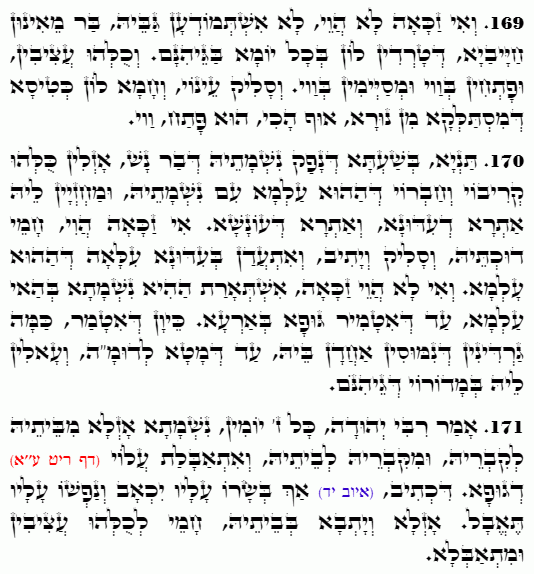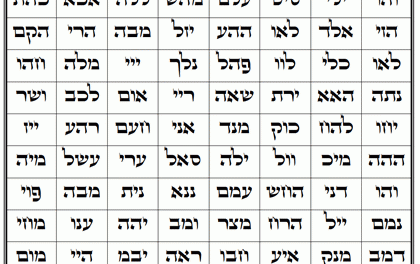Daily Zohar # 4748 – Vayechi – When the soul leaves the body
Daily Zohar 4748

Hebrew translation:
170. לָמַדְנוּ, בְּשָׁעָה שֶׁיּוֹצֵאת נִשְׁמַת הָאָדָם, הוֹלְכִים כָּל קְרוֹבָיו וַחֲבֵרָיו שֶׁבְּאוֹתוֹ עוֹלָם עִם נִשְׁמתוֹ, וּמַרְאִים לוֹ מְקוֹם הָעִדּוּן וּמְקוֹם הָעֹנֶשׁ. אִם הוּא צַדִּיק, רוֹאֶה אֶת מְקוֹמוֹ, וְעוֹלֶה וְיוֹשֵׁב וּמִתְעַדֵּן בְּעִדּוּן עֶלְיוֹן שֶׁל אוֹתוֹ עוֹלָם. וְאִם אֵינוֹ צַדִּיק, נִשְׁאֶרֶת אוֹתָהּ נְשָׁמָה בָּעוֹלָם הַזֶּה עַד שֶׁנִּטְמָן הַגּוּף בַּקַּרְקַע. כֵּיוָן שֶׁנִּטְמָן, כַּמָּה שׁוֹמְרֵי הַחֻקִּים אוֹחֲזִים בּוֹ עַד שֶׁמַּגִּיעַ לְדוּמָ”ה, וּמַכְנִיסִים אוֹתוֹ בַּמָּדוֹר שֶׁלּוֹ שֶׁל הַגֵּיהִנֹּם.
171. אָמַר רַבִּי יְהוּדָה, כָּל שִׁבְעַת הַיָּמִים הַנְּשָׁמָה הוֹלֶכֶת מֵהַבַּיִת לְקִבְרוֹ וּמִקִּבְרוֹ לַבַּיִת, וּמִתְאַבֶּלֶת עָלָיו עַל הַגּוּף, שֶׁכָּתוּב (איוב יד) אַךְ בְּשָׂרוֹ עָלָיו יִכְאָב וְנַפְשׁוֹ עָלָיו תֶּאֱבָל. הוֹלֶכֶת וְיוֹשֶׁבֶת בְּבֵיתוֹ, וְרוֹאָה אֶת כֻּלָּם עֲצוּבִים וַאֲבֵלִים.
.
Zohar Vayechi
Continued from previous DZ
#169
If a person is not righteous, these souls do not reveal themselves to him. Instead, wicked ones, who are punished every day in Gehinnom, appear to him. They are all sorrowful, beginning with a cry of “Woe” and ending with a cry of “Woe.” The person lifts his eyes and sees them as something scorched, rising from the fire. He, too, cries out, saying, “Woe” for them. They seemed to him as something burned in a fire and removed before it is entirely consumed, like a smoldering ember saved from the flames, as in “גֵץ שֶׁעוֹלֶה מֵהָאֵשׁ” “a plucked from the fire.”
#170
We have learned that when a person’s soul departs from this world, all their relatives and friends in the World of Truth accompany the soul. They show the places of pleasure in the Garden of Eden and the place of punishment. If the person is righteous, they see their place and ascend to sit and delight in the Upper Garden of Eden in that world.
And if they are not righteous, The soul remains in this world until the body is buried in the ground. Once the burial occurs, various prosecutors seize the soul until it reaches Dumah, who oversees Gehinnom, and they bring the soul into the chambers of Gehinnom.
#171
Rabbi Yehuda said: During the seven days of mourning, the soul goes back and forth between the house and the grave, and from the grave back to the house, mourning for the body. As it is written: “אך בשרו עליו יכאב ונפשו עליו תאבל”—”Only his flesh upon him shall have pain, and his soul within him shall mourn” (Job 14:22).
The soul goes and sits in the house, sees everyone mourning, and it, too, mourns.
Notes:
This Zohar passage describes the soul’s journey after death, emphasizing the contrast between the experiences of the righteous and the unrighteous. The righteous are escorted by spiritual guides to their destined place in the Upper Garden of Eden, where they enjoy the light of the Shechina. On the other hand, the unrighteous face a more turbulent transition, remaining earthbound until burial, after which they are subjected to judgment by spiritual prosecutors and ultimately sent to Gehinnom under the supervision of Dumah. During the seven days of mourning, the soul remains tied to the physical realm, sharing in the mourning for its departed body, emphasizing the spiritual significance of the Shiva period.
The description highlights the spiritual justice system, where the soul’s deeds during its lifetime determine its dwelling place in the heavens.
{||}

 Previous: Vayechi
Previous: Vayechi


